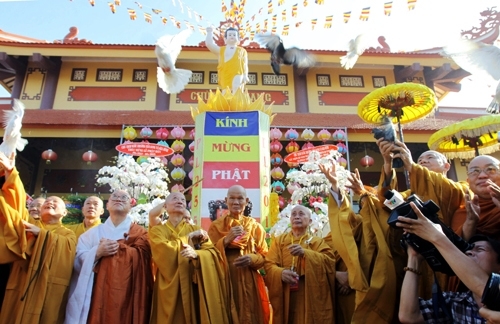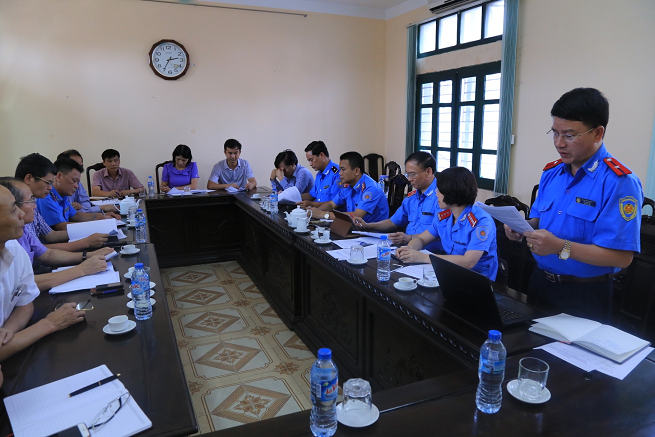The People's Public Security (PPS amended) Law has just been passed by the National Assembly, incorporating many new points. Among them, the aspect that has garnered attention is the regulations regarding the rank system of officers, non-commissioned officers, and soldiers of the PPS. Compared to the 2005 PPS Law (currently in effect), there have been numerous changes in the promotion and conferral of ranks, including for students graduating from PPS schools.
Outstanding Graduates to be Promoted to Higher Ranks
Law on People’s Public Security 2005 stipulates: “University graduates from People’s Public Security schools are conferred the rank of Second Lieutenant; intermediate-level graduates are conferred the rank of Sergeant.” The law does not stipulate promotion to higher ranks in the case of outstanding graduation, but in the implementing guidance document, those who graduate with excellent or good results are promoted one year ahead of schedule. Article 21 of the amended Law on People’s Public Security this time has adjusted this content. Students of People’s Public Security schools upon graduation are conferred ranks as follows: intermediate level conferred Sergeant; college level conferred Senior Sergeant; university level conferred Second Lieutenant. In cases of outstanding graduation, they are conferred one rank higher. Thus, intermediate-level students of People’s Public Security who graduate outstandingly are conferred the rank of Senior Sergeant; outstanding college graduates are conferred the rank of Second Lieutenant; outstanding university graduates are conferred the rank of First Lieutenant.
These provisions are intended to encourage students to study diligently. For a long time, the program at People’s Public Security academies lasted 5 years, while universities were only 4 years, so academy graduates were disadvantaged because their rank was still Second Lieutenant, similar to university graduates who only studied for 4 years. Now, the training program at the academies has also been shortened to 4 years. If they graduate outstandingly, they will be directly promoted to First Lieutenant, surpassing 3 years (while the normal condition before to be promoted to First Lieutenant took 7 years, including 5 years of study and 2 years of seniority). According to the regulations of the Ministry of Education and Training, outstanding is a cumulative score of 9.0 to 10. The training program at People’s Public Security schools is heavy on political theory and professional skills, making it very difficult for students to reach this cumulative score. Meanwhile, a score of 9.0 is not too difficult for students majoring in mathematics, informatics, and foreign languages in People’s Public Security schools, so this will be a great advantage for these students to be conferred the rank of First Lieutenant immediately upon graduation. On the other hand, many students reported that due to educational requirements, grading at the academies is much stricter compared to intermediate and college schools, so students at the college and intermediate levels have an advantage in obtaining outstanding or excellent grades.

Reduction in the Number of General Officers
According to the Politburo's requirements, the promotion and conferral of general officer ranks must ensure strictness, science, and apply only to truly important positions. Therefore, the amended Law on People’s Public Security has “tightened” the conditions and positions eligible for the promotion and conferral of general officer ranks. For the rank of Major General, it is only applicable to officers holding the positions of Director General and equivalent of important departments in advisory, political, and professional areas. Directors of departments such as Logistics Department, General Department Inspectorate, Standing Office of the Human Rights Steering Committee... are conferred the highest rank of Colonel. For the rank of Lieutenant General, it is only applicable to positions including: General Director, Commander, Political Commissar, Director of the Strategic Institute, Chief Inspector, Director of Hanoi and Ho Chi Minh City Police, Directors of the Public Security Academies of Security, Politics, Police, Directors of six Departments within the Ministry (Cyber Security; Traffic Police; Fire Prevention and Rescue; Foreign Affairs; Legal and Judicial Reform; Building the Movement of All People to Protect National Security) and one Deputy General Director who is Secretary or Deputy Secretary of the Central Public Security Party Committee. Thus, each General Department has a maximum of two Lieutenant Generals.
The law this time specifies the number of deputy positions holding general officer ranks. Specifically: for the Deputy Minister positions, the maximum rank of Senior Lieutenant General is 6. For deputies holding the rank of Major General, the regulations are as follows: Deputy General Directors maximum 5 Major Generals (along with 1 Lieutenant General as mentioned above); Deputy Commanders of the Mobile Police Command maximum 4 Major Generals; Deputy Political Commissar of the Mobile Police Command is 1 Major General; Deputy Commanders of the Guard Command maximum 4 Major Generals; Deputy Chief Offices of the Ministry of Public Security maximum 3 Major Generals; Deputy Chief Inspectors maximum 3 Major Generals; Deputy Directors of the Strategic and Scientific Institute of Public Security maximum 3 Major Generals; Ministry-level Deputy Directors maximum 2 Major Generals; Deputy Directors of the Public Security Academies of Security, Politics, and Police, each unit maximum 3 Major Generals; Deputy Directors of Hanoi and Ho Chi Minh City Police, each unit maximum 3 Major Generals.
The amended Law on People’s Public Security does not stipulate the rank of general officers for officers holding positions in local police (except for Hanoi and Ho Chi Minh City). The previous draft stipulated that the Directors of the police of 6 provinces including Hai Phong, Da Nang, Can Tho, Nghe An, Thanh Hoa, Dong Nai have the rank ceiling of Major General. However, to be consistent with the rank in the Vietnam People’s Army, the National Assembly decided that the Directors of the police and the Commanders of the Military Command of 61 provinces and cities have the rank ceiling of Colonel. To ensure consistency, accordingly, the rank of the Chief of District, Commune Police (including Hanoi and Ho Chi Minh City), Heads of Departments is also reduced by one rank compared to the current law, the highest being Senior Lieutenant Colonel (currently Colonel).
The duration for rank promotion for non-commissioned officers, commissioned officers, and field officers remain unchanged as in the 2005 Law on People’s Public Security. For general ranks, the 2005 Law on People’s Public Security did not specify the duration. This law has now adjusted, stipulating that the duration for rank promotion from Colonel to Major General is 4 years, and the duration for rank promotion within each general rank is a minimum of 4 years. The age of officers being considered for promotion from Colonel to Major General is not more than 57, in cases of higher age, it will be implemented according to the regulations of the authorized agency of the Communist Party of Vietnam.
For positions in the Central Public Security Party Committee's Inspection Committee, according to the provisions of Clause 2, Article 24 of the Law on People’s Public Security, only the Standing Deputy Head and full-time Deputy Heads are conferred general officer ranks. Thus, the Members of the Central Public Security Party Committee's Inspection Committee have the highest rank of Colonel (currently Major General).
Abolishment of “Special Important Units, Key Areas” Provisions
The 2005 Law on People’s Public Security stipulated, “Officers holding basic positions in units assigned with special important tasks or areas with critical positions in terms of security and order may have the highest rank up to one rank higher than the highest rank for the corresponding position.” In practice, it is very difficult to quantify what a special important unit is and what a key area is, as each perspective has different approaches. Therefore, this law eliminates the above provision. This means that rank ceilings apply uniformly across all units and localities, with no exceptions of “special cases may be one rank higher.”
Specific Provisions on the Ranks of Seconded Police Officers
The 2005 Law on People’s Public Security only stipulated in general and did not specify the promotion and conferral of ranks corresponding to the positions of seconded police officers. For a long time, seconded police and military officers holding positions such as in the National Assembly’s Defense and Security Committee were not considered for rank promotion. Recently, this inadequacy has been adjusted. And Clause 3, Article 24 of the amended Law on People’s Public Security has specified this content. Seconded police officers who are standing members of the National Assembly’s Defense and Security Committee or appointed to the positions of General Director and equivalent have the highest rank of Major General. Seconded officers who are Deputy Heads of the National Assembly’s Defense and Security Committee or appointed to the position of Deputy Minister or equivalent have the highest rank of Lieutenant General. Higher-positioned seconded officers are promoted to general ranks as per the authorized agency of the Communist Party of Vietnam’s regulations.
Law on People’s Public Security 2014 took effect from July 1, 2015. Only the provisions regarding the promotion, demotion, and stripping of general ranks take effect from the date the law is announced. The announcement of the law is within the authority of the President, after the law has been passed.
Source: cand.com.vn
 Article table of contents
Article table of contents
![[InfoGraphic] 6 forms of discipline for officials and public employees under Decree 71/2016/ND-CP](https://cdn.lawnet.vn//uploads/NewsThumbnail/2016/07/12/1319291-01.png)




.Medium.png)
.Medium.png)
.Medium.png)
.Medium.png)
